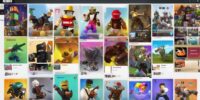What Is the Best Age to Start Playing Minecraft?

The best age to start playing Minecraft is around 8-12 years old.
This is when children have developed the cognitive skills needed to fully enjoy and engage with the game.
Factors to Consider
Before starting on your Minecraft journey, it's essential to contemplate several key factors that can greatly influence your experience and success in the game. Parental guidance plays a pivotal role in determining when you're ready to begin on this adventure. Your guardians can offer valuable insights into whether you're emotionally and mentally prepared to handle the challenges and interactions within the Minecraft world.
Developmental readiness is another critical aspect to ponder. Evaluating your cognitive abilities, problem-solving skills, and capacity to differentiate between fantasy and reality is essential. Minecraft can be a stimulating platform for growth and learning, but being developmentally ready ensures that you can fully grasp and benefit from the experience.
In the domain of Minecraft, freedom is a prized possession. It allows you to explore, create, and innovate at your own pace. Embrace this freedom but remember that with it comes responsibility. By acknowledging the significance of parental guidance and ensuring your developmental readiness, you set the stage for a fulfilling and enriching Minecraft journey ahead.
Benefits of Early Exposure
Embrace the wonders that early exposure to Minecraft can bring, fostering cognitive development, igniting creativity, and honing problem-solving skills.
The journey of young minds through the domain of Minecraft not only entertains but also educates, sculpting a path towards well-rounded growth.
With each block placed and each challenge conquered, the seeds of lifelong skills take root, nurturing a flourishing garden of knowledge and innovation.
Early Cognitive Development
Nurturing young minds through early exposure to Minecraft fosters cognitive development, releasing a world of creativity and problem-solving skills.
Play-based learning in Minecraft allows for early exploration of virtual worlds, stimulating critical thinking and decision-making abilities. By engaging with the game's mechanics, young players develop spatial awareness, strategic planning, and adaptability.
The interactive nature of Minecraft encourages experimentation and curiosity, promoting a growth mindset essential for lifelong learning. Through building, crafting, and problem-solving within the game, children enhance their cognitive flexibility and spatial reasoning.
Early cognitive development through Minecraft empowers young individuals to approach challenges with resilience and ingenuity, laying a strong foundation for future academic and personal success.
Creativity and Problem-Solving
In the domain of early cognitive development lies a profound gateway to revealing the boundless domains of creativity and problem-solving within young minds through exposure to Minecraft. Engaging with this virtual world from a tender age fosters critical thinking and problem-solving skills in ways that traditional learning often cannot.
Consider the following:
- Releasing Imagination: Minecraft allows you to build entire worlds from scratch, encouraging you to think outside the box and explore endless possibilities.
- Solving Complex Challenges: Navigate through intricate tasks, from constructing elaborate structures to surviving in hostile environments, honing your problem-solving abilities.
- Encouraging Innovation: Experimentation is key in Minecraft, pushing you to innovate and adapt, essential skills for tackling real-world challenges.
Age-Appropriate Gameplay Features
Choosing age-appropriate gameplay features in Minecraft is essential for fostering an enriching and engaging gaming experience for young players. Parental guidance plays a fundamental role in ensuring that children are exposed to content that aligns with their developmental stage. Minecraft offers a range of settings and options that can be tailored to suit the needs of each child, promoting both fun and learning.
Child safety is paramount in the world of gaming, and Minecraft provides tools for parents to regulate online interactions and monitor gameplay. Encouraging exploration and creativity, while also maintaining a safe environment, is key to a positive gaming experience for children. By enabling features such as chat restrictions and world-sharing controls, caregivers can empower young players to enjoy the game responsibly.
In Minecraft, the ability to customize gameplay settings allows for a personalized experience that can adapt as a child grows and develops. By understanding and utilizing these features, parents can create a space where children can thrive, learn, and have fun in a safe and age-appropriate digital playground.
Risks of Starting Too Young
Starting Minecraft too young can pose risks to your early cognitive development. The game requires problem-solving and critical thinking skills that may be challenging for very young children. Additionally, social interaction skills might not fully develop if too much time is spent in front of a screen. This can potentially hinder real-life communication abilities. It is essential to manage screen time effectively to guarantee a healthy balance between virtual and real-world experiences.
Early Cognitive Development
Beginning on the journey of Minecraft at a tender age may pose potential risks to early cognitive development. While the allure of the game is strong, it's important to mull over the impact it may have on young minds. Here are some key points to ponder:
- Brain Development: Intense screen time at a young age can impact the natural development of a child's brain.
- Problem Solving Skills: Overexposure to complex digital environments may hinder the organic growth of problem-solving abilities.
- Early Learning, Digital Literacy: Balance is vital; too much time on Minecraft could impede a child's overall early learning and development of essential digital literacy skills.
Social Interaction Skills
Starting on the Minecraft journey at a young age may unintentionally compromise the development of essential social interaction skills, posing potential risks that warrant careful consideration. Peer relationships and communication skills are crucial components of a child's growth and are often honed through face-to-face interactions.
While Minecraft can offer a platform for virtual socializing, it may not fully substitute for the nuances of in-person communication. Engaging in collaborative tasks within the game can be beneficial, but vital to balance this with real-world interactions to foster empathy, teamwork, and conflict resolution abilities.
Encouraging your child to participate in a variety of activities, both on and off-screen, can help them develop a well-rounded set of social skills that will serve them well in diverse settings.
Screen Time Management
To initiate the Minecraft journey at a tender age, one must be mindful of the potential pitfalls of excessive screen time and its impact on a child's overall development. Parental guidance is paramount in maneuvering the digital landscape wisely.
Here's a trio of considerations to ponder upon:
- Quality over Quantity: Encourage breaks and engage in diverse activities.
- Bedtime Boundaries: Maintain healthy sleep habits by limiting screen time before bed.
- Balanced Lifestyle: Guarantee Minecraft doesn't overshadow real-world interactions and physical activities.
Impact on Cognitive Skills
Embark on the journey of honing your cognitive abilities through the immersive domain of Minecraft. As you explore this pixelated universe, you will find that it offers a plethora of opportunities to enhance your mental faculties. From memory retention and problem-solving to attention span and spatial skills, Minecraft serves as a playground for your mind to flourish.
To illustrate the impact of Minecraft on cognitive skills, consider the following table:
| Cognitive Skills | Description | Benefits |
|---|---|---|
| Memory Retention | Remembering patterns, recipes, and layouts | Enhances recall abilities |
| Problem Solving | Analyzing situations and finding solutions | Improves critical thinking and decision-making |
| Attention Span | Focusing on tasks for extended periods | Boosts concentration and perseverance |
| Spatial Skills | Understanding 3D environments and structures | Enhances visual-spatial awareness |
Through engaging with Minecraft, you not only sharpen your cognitive prowess but also foster a sense of creativity and resourcefulness. So, embrace the journey ahead and let your cognitive skills thrive in the boundless realms of Minecraft.
Social Development Opportunities
As you immerse yourself in the intricate landscapes of Minecraft, a domain brimming with possibilities, you'll discover avenues for nurturing your social skills and fostering meaningful connections with others. In this domain, where creativity knows no bounds and imagination thrives, the game offers a unique platform for enhancing your social development.
Here's how Minecraft can shape your social skills:
- Peer Relationships: Engage in collaborative projects with friends or make new connections within the Minecraft community, fostering teamwork and camaraderie.
- Communication Skills: Whether through in-game chat, voice communication, or cooperative gameplay, Minecraft provides a space for you to practice expressing ideas and working together effectively.
- Shared Experiences: Create shared memories with others through adventures, challenges, and triumphs in Minecraft, strengthening bonds and building a sense of community.
In the dynamic world of Minecraft, the opportunities for growth extend beyond the digital domain, enriching your social interactions and nurturing essential skills for the future.
Parental Involvement Importance
Engage actively with your child's Minecraft adventures to understand the profound impact parental involvement can have on their gaming experience and overall development. Parental guidance in the world of Minecraft isn't just about setting time limits or monitoring content; it's about diving into the blocky world alongside your child. By participating in their gameplay, you gain insight into their interests, challenges, and triumphs. This shared experience fosters a deeper connection and opens the door for meaningful conversations about various aspects of the game.
As a parent, your involvement can help scaffold your child's understanding of complex game mechanics, problem-solving skills, and creativity. By recognizing their developmental milestones within Minecraft, you can tailor your support to enhance their learning experience. Your guidance can empower them to navigate virtual worlds with confidence and apply critical thinking skills beyond the game. Embrace the opportunity to be a partner in your child's Minecraft journey, and witness the positive impact of your involvement on their growth and development.
Frequently Asked Questions
How Can Parents Monitor and Limit Their Child's Screen Time While Playing Minecraft?
To manage screen time while playing Minecraft, utilize parental controls and set time limits. Encourage healthy habits by balancing screen time with outdoor play. Be mindful of your child's digital consumption to foster a well-rounded lifestyle.
Are There Any Recommended Online Safety Measures for Children Playing Minecraft?
When it comes to safeguarding your child in the vast world of Minecraft, remember to set up parental controls for a secure gaming experience. Stay vigilant against cyberbullying, monitor online communities, and emphasize account security.
Can Playing Minecraft at a Young Age Affect a Child's Physical Development in Any Way?
Playing Minecraft at a young age can impact cognitive development and social skills positively. However, make sure a balance with physical activity and outdoor play to support overall growth and well-being. Moderation is key to holistic development.
Are There Any Potential Drawbacks to Starting to Play Minecraft at an Older Age?
Starting Minecraft at an older age may pose challenges with the learning curve and time commitment, but don't underestimate the cognitive benefits and social interaction it can offer. Embrace the adventure at any age!
How Can Parents Encourage Their Child to Balance Playing Minecraft With Other Activities and Responsibilities?
To balance playing Minecraft with other activities, prioritize time management by setting aside specific hours for gaming and extracurriculars. Parents, offer guidance and establish healthy boundaries. Encourage a balanced lifestyle where fun and responsibilities coexist harmoniously.








